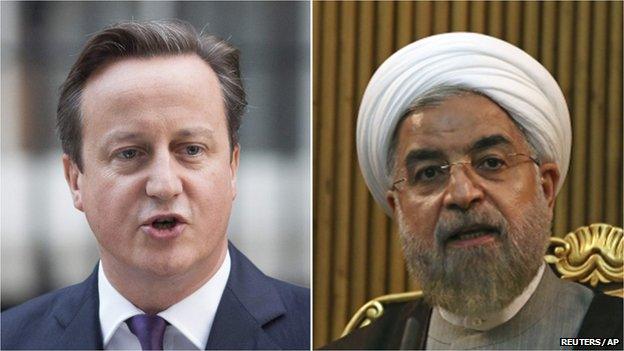Cameron to meet Iran's Rouhani for talks
- Published

David Cameron and Hassan Rouhani spoke by phone last year but have never had a face-to-face meeting
David Cameron is to meet Iranian President Hassan Rouhani.
The New York meeting comes after the US and its allies began air strikes against Islamic State (IS) in Syria, but the proposed nature of Iranian action is unclear.
It will be the first time a UK prime minister has met an Iranian president since the Iran's revolution in 1979.
The UK government said it had not joined Syria strikes "yet", but debate may begin in Parliament this week.
BBC assistant political editor Norman Smith said there was a "very strong likelihood" that Parliament would be recalled from recess "within the next few days" to sanction any British military action.
Shadow business secretary Chuka Umunna said should Labour be asked to consider the case for action, it would apply the same criteria it did when asked about British military intervention against the Syrian regime, which was rejected by MPs last year.
But Mr Umunna told BBC Radio 4's Today he thought the public made a distinction between the threat posed by IS and that of Syria.
"This is not a party political issue," he said. "IS need to be eliminated. They are an evil organisation."
Mr Cameron and Mr Rouhani spoke by phone in November, but the talks later will be their first face-to-face meeting.
The PM was likely to set out "direction and options" during his speech at the United Nations' headquarters in New York, a government source told BBC News.
Nuclear 'trade-off'
BBC correspondent Nick Bryant said relations between the UK and Iran had "thawed considerably" in recent months.
"Coming at a time when the Obama administration has said Iran has a role to play in combating IS, Mr Cameron is expected to gauge what form that might take," he said.
Mr Cameron is also likely to press Mr Rouhani to withdraw support for the Assad regime in Syria - a "hard sell", our correspondent added.
He said Iranian officials in the US had raised the possibility of a "trade-off" under which Iran could get concessions on advancing its nuclear programme in exchange for "further action" against IS - though the US has said the two issues are entirely separate.
'Not ruled out'
The US has been carrying out air strikes against IS militants in Iraq since August, and the Pentagon has now announced similar action in Syria.
Rear Adm John Kirby said: "I can confirm that US military and partner nation forces are undertaking military action against Isil terrorists in Syria using a mix of fighter, bomber and Tomahawk land attack missiles."
Asked if the UK was one of those "partner" nations, a Ministry of Defence spokeswoman told the BBC: "The UK has not committed anything yet. Conversations are ongoing.
"There might potentially be an update in the coming days. We have not ruled ourselves out."
Labour deputy leader Harriet Harman said it was "very encouraging that other Arab states are joining in... because they are the most immediately affected".
She told BBC News: "Islamic State needs to be contained... They can't be allowed to just grow and grow and grow and expand their territory."
Jihadist group IS, also referred to as Isil and Isis, has taken control of large areas of Iraq and Syria in recent months.